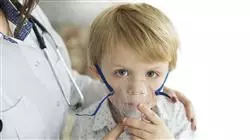University certificate
The world's largest faculty of medicine”
Introduction to the Program
You will learn about the most recent advances in acute ataxia, constipation and urinary tract congenital anomalies”

A specialist who knows about the most prevalent pathologies in hospital pediatrics must have access to the most recent scientific studies on them in order to continue offering the best possible care.
With this in mind, TECH Global University has brought together a group of leading specialists in the pediatric field to develop a program that compiles the latest developments in the most urgent specialist areas.
This Postgraduate diploma includes, among others, advances in febrile crises, digestive hemorrhages, acute renal damage and inhalation systems.
All this is provided in a modern and avant-garde program, which makes use of the most powerful educational technology so specialists can make the most of all the up-to-date knowledge provided.
It should be noted that the course is 100% online, which allows students to easily balance it with the most demanding work and life rhythms. All the teaching material can be downloaded from any device with an Internet connection and can be studied at any time.
You will give a significant boost to your career thanks to the advanced content on pediatrics found in this Postgraduate diploma”
This Postgraduate diploma in Most Prevalent Pathologies in Hospital Pediatrics contains the most complete and up-to-date scientific program on the market. Its most notable features are:
- Practical case studies presented by experts in hospital pediatrics
- The graphic, schematic, and eminently practical contents with which they are created, provide scientific and practical information on the disciplines that are essential for professional practice
- Practical exercises where the self-assessment process can be carried out to improve learning
- Special emphasis on innovative methodologies in the approach to pneumological affections
- Theoretical lessons, questions to the expert, debate forums on controversial topics, and individual reflection assignments
- Content that is accesible from any fixed or portable device with an Internet connection
You will constantly be supported by technical and academic personnel committed to aiding you in updating and refreshing your knowledge of the most prevalent pathologies of pediatrics”
The program’s teaching staff includes professionals in the sector who contribute their work experience to this program, as well as renowned specialists from leading societies and prestigious universities.
The multimedia content, developed with the latest educational technology, will provide the professional with situated and contextual learning, i.e., a simulated environment that will provide an immersive program designed to learn in real situations.
This program is designed around Problem-Based Learning, whereby the professional must try to solve the different professional practice situations that arise during the academic year. For this purpose, the student will be assisted by an innovative interactive video system created by renowned and experienced experts.
Access recent advances in the treatment of urinary tract infections (UTIs), congenital urinary tract anomalies, acute kidney injury and more pediatric nephrotic pathologies"

Study wherever, whenever and however it suits you on a program that gives you the flexibility that specialists like you need"
Why study at TECH?
TECH is the world’s largest online university. With an impressive catalog of more than 14,000 university programs available in 11 languages, it is positioned as a leader in employability, with a 99% job placement rate. In addition, it relies on an enormous faculty of more than 6,000 professors of the highest international renown.

Study at the world's largest online university and guarantee your professional success. The future starts at TECH”
The world’s best online university according to FORBES
The prestigious Forbes magazine, specialized in business and finance, has highlighted TECH as “the world's best online university” This is what they have recently stated in an article in their digital edition in which they echo the success story of this institution, “thanks to the academic offer it provides, the selection of its teaching staff, and an innovative learning method aimed at educating the professionals of the future”
A revolutionary study method, a cutting-edge faculty and a practical focus: the key to TECH's success.
The most complete study plans on the university scene
TECH offers the most complete study plans on the university scene, with syllabuses that cover fundamental concepts and, at the same time, the main scientific advances in their specific scientific areas. In addition, these programs are continuously being updated to guarantee students the academic vanguard and the most in-demand professional skills. In this way, the university's qualifications provide its graduates with a significant advantage to propel their careers to success.
TECH offers the most comprehensive and intensive study plans on the current university scene.
A world-class teaching staff
TECH's teaching staff is made up of more than 6,000 professors with the highest international recognition. Professors, researchers and top executives of multinational companies, including Isaiah Covington, performance coach of the Boston Celtics; Magda Romanska, principal investigator at Harvard MetaLAB; Ignacio Wistumba, chairman of the department of translational molecular pathology at MD Anderson Cancer Center; and D.W. Pine, creative director of TIME magazine, among others.
Internationally renowned experts, specialized in different branches of Health, Technology, Communication and Business, form part of the TECH faculty.
A unique learning method
TECH is the first university to use Relearning in all its programs. It is the best online learning methodology, accredited with international teaching quality certifications, provided by prestigious educational agencies. In addition, this disruptive educational model is complemented with the “Case Method”, thereby setting up a unique online teaching strategy. Innovative teaching resources are also implemented, including detailed videos, infographics and interactive summaries.
TECH combines Relearning and the Case Method in all its university programs to guarantee excellent theoretical and practical learning, studying whenever and wherever you want.
The world's largest online university
TECH is the world’s largest online university. We are the largest educational institution, with the best and widest online educational catalog, one hundred percent online and covering the vast majority of areas of knowledge. We offer a large selection of our own degrees and accredited online undergraduate and postgraduate degrees. In total, more than 14,000 university degrees, in eleven different languages, make us the largest educational largest in the world.
TECH has the world's most extensive catalog of academic and official programs, available in more than 11 languages.
Google Premier Partner
The American technology giant has awarded TECH the Google Google Premier Partner badge. This award, which is only available to 3% of the world's companies, highlights the efficient, flexible and tailored experience that this university provides to students. The recognition as a Google Premier Partner not only accredits the maximum rigor, performance and investment in TECH's digital infrastructures, but also places this university as one of the world's leading technology companies.
Google has positioned TECH in the top 3% of the world's most important technology companies by awarding it its Google Premier Partner badge.
The official online university of the NBA
TECH is the official online university of the NBA. Thanks to our agreement with the biggest league in basketball, we offer our students exclusive university programs, as well as a wide variety of educational resources focused on the business of the league and other areas of the sports industry. Each program is made up of a uniquely designed syllabus and features exceptional guest hosts: professionals with a distinguished sports background who will offer their expertise on the most relevant topics.
TECH has been selected by the NBA, the world's top basketball league, as its official online university.
The top-rated university by its students
Students have positioned TECH as the world's top-rated university on the main review websites, with a highest rating of 4.9 out of 5, obtained from more than 1,000 reviews. These results consolidate TECH as the benchmark university institution at an international level, reflecting the excellence and positive impact of its educational model.” reflecting the excellence and positive impact of its educational model.”
TECH is the world’s top-rated university by its students.
Leaders in employability
TECH has managed to become the leading university in employability. 99% of its students obtain jobs in the academic field they have studied, within one year of completing any of the university's programs. A similar number achieve immediate career enhancement. All this thanks to a study methodology that bases its effectiveness on the acquisition of practical skills, which are absolutely necessary for professional development.
99% of TECH graduates find a job within a year of completing their studies.
Postgraduate Diploma in Most Prevalent Pathologies in Hospital Pediatrics
Hospital pediatrics deals with the diagnosis and treatment of pediatric diseases requiring hospitalization.
Most Prevalent Pathologies in Hospital Pediatrics.
Acute respiratory infections: These are the most common pathologies in childhood and may be due to different causes, including viruses and bacteria. Depending on the severity of the infection, treatment may include medications and oxygen therapy.
Asthma: This is a chronic disease that causes inflammation of the airways and makes breathing difficult. Symptoms can range from mild to severe, and treatment may include inhaled and/or oral medications, as well as preventive measures such as avoiding asthma triggers.
Gastroenteritis: is inflammation of the stomach and intestines causing diarrhea, vomiting and abdominal pain. It can be caused by viruses, bacteria or parasites and is usually treated with medications and rehydration measures (such as giving intravenous fluids).
Diabetes mellitus type 1: This is an autoimmune disease in which the body does not produce enough insulin to regulate blood glucose levels. Treatment consists of insulin administration by injection or through an insulin pump, as well as diet and exercise control measures.
Anemia: This is a deficiency of red blood cells or hemoglobin in the blood, resulting in fatigue and weakness. Treatment may include iron supplements, blood transfusions and/or dietary changes.
Other pathologies that are also common in hospital pediatrics include hematologic disorders, neuromuscular diseases, congenital cardiovascular pathologies, neonatal developmental disorders and renal diseases.
The goal of the program is to provide students with a thorough understanding of the most prevalent pathologies in hospital pediatrics. Students will learn how to evaluate, diagnose and treat pediatric patients presenting with these pathologies. Emphasis will also be placed on the comprehensive and multidisciplinary management of patients, including critical and palliative care, as well as attention to ethical and psychological aspects in hospital pediatric care.







